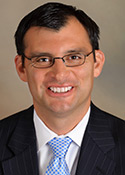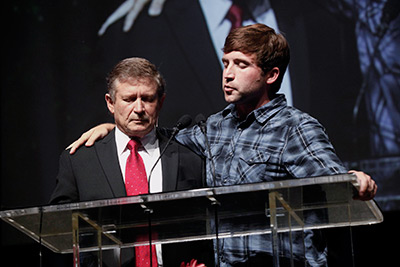A Father’s Day theme marked the opening session of the 2012 Southern Baptist Convention Pastors’ Conference, with speakers being introduced by either their fathers or their sons.
The Pastors’ Conference was held June 17-18 at the Ernest N. Morial Convention Center, preceding the SBC annual meeting. Speakers addressed the theme, “Changing Lives, Communities and the World.”
Spartanburg pastor Don Wilton and his son Rob were among the father-and-son pastors who spoke.
 Paul Jimenez
Paul JimenezOn the second day of the meeting, Paul Jimenez, pastor of Taylors First Baptist Church, was elected vice president of the SBC Pastors’ Conference.
Don Wilton, pastor of First Baptist Church in Spartanburg, described three pictures from 2 Timothy 2 of what it means to be strong in the grace of God. Pastors, he said, must fight like soldiers, run like athletes and work like farmers in their ministries.
“[God is] calling us to become fathers to our sons and to our daughters, to lead by example and to be the kind of dads in the ministry that God has called us to be,” Wilton said.
The United States is facing a battle that may be unprecedented in its history, Wilton said, and the church needs men who will fight passionately for the gospel.
 Rob Wilton, right, pastor of Vintage Church of New Orleans, prays with his father, Don Wilton, during the evening session June 17 of the 2012 SBC Pastors’ Conference. Don Wilton,who preached, is senior pastor of First Baptist Church, Spartanburg.
Rob Wilton, right, pastor of Vintage Church of New Orleans, prays with his father, Don Wilton, during the evening session June 17 of the 2012 SBC Pastors’ Conference. Don Wilton,who preached, is senior pastor of First Baptist Church, Spartanburg. “It’s not going to take somebody in the White House who will change these United States of America,” Wilton said. “It’s going to take the Lord Jesus Christ, by his Spirit, changing the hearts and lives of our people.”
Wilton warned of the dangers if the Southern Baptist Convention embraces a form of idolatry by following too closely after individuals rather than after Jesus himself.
“It is only the Lord our God that we serve,” he said.
Wilton’s son Rob, pastor of Vintage Church in New Orleans, introduced his father by describing him as being personal, loving, challenging and encouraging. As he thought about the text from which his father would preach, Rob Wilton said he “couldn’t help but pause and thank God that the ‘Paul’ in my life has been my dad.”
Other father-and-son speakers included Bailey and Josh Smith, Ronnie and Nick Floyd, and Tony and Anthony Evans.
Johnny Hunt, senior pastor of First Baptist Church in Woodstock, Ga., opened the Tuesday morning session with a message of hope to pastors who feel like “a wineskin in smoke.”
Referring to the term from Psalm 119:83, Hunt described the time after his diagnosis, treatment and recovery from prostate cancer when, from a ministry perspective, something inside of him died. “I can remember going weeks and just wondering, Will there ever be another hopeful day in my life?”
Eventually, Hunt recalled, he slowly began feeling like his old self. “God really did restore the joy, the strength and the passion,” he said.
For those experiencing similar situations, Hunt said Psalm 119:81-88 is about a new beginning.
Wayne Robertson, pastor of Morningside Baptist Church in Valdosta, Ga., said pastors can experience God’s protection when they are persecuted – even though persecution of American ministers is vastly different than persecution of first-century believers.
“Because of our laws, we’re not as prone to hear of people dying for their faith in this country,” he said. “In our sophistication, we are far more prone to destroy a person’s reputation, and there is more than one way of persecuting someone.”
Preaching from John 16, Robertson said remaining faithful to God is the first key to experiencing protection amid attacks. In moments of mistreatment, remembering God’s call to ministry will help pastors press on, he said.
Phil Hoskins, senior pastor of Higher Ground Baptist Church in Kingsport, Tenn., challenged Southern Baptists to be empowered by the Holy Spirit.
Speaking from Acts 2, Hoskins observed that in many congregations it appears that the Holy Spirit is either overlooked or absent.
Hoskins observed that the “greatest need of the hour is for the Holy Spirit to breathe a fresh breath of heaven across our lives, our churches and, ultimately, our nation.”
Just as Jesus endured the cross for greater glory, Christian leaders should keep the end in mind amid discouragement – “lest you be weary and faint in your minds,” said David Jeremiah, quoting the end of Hebrews 12:3 in his message to the Pastors’ Conference.
Jeremiah, pastor of Shadow Mountain Community Church in El Cajon, Calif., used Hebrews 12:1-3, a familiar passage about believers – being surrounded by so great a cloud of witnesses – to finish the race of ministry.
The Hebrews author was writing to those who had converted to Christianity who were discouraged and tempted to quit. The persecution was so intense that some thought of going back to their old lives, Jeremiah said.
The incentive for their continued journey, Jeremiah said, was the cloud of witnesses in the passage – witnesses of the past – who testified that the race could be finished honorably.
Preacher-comedian Dennis “The Swan” Swanberg unveiled his humor and his staple impersonations before moving into a brief message from John 11 and 12 about Jesus and his friends Mary, Martha and Lazarus.
Swanberg, billed as “America’s Minister of Encouragement,” said Jesus especially loved “real people” such as the three siblings in the biblical account.
In fact, Swanberg said, Lazarus might have been Jesus’ best friend, even though the Bible doesn’t record a word from him “because he couldn’t get a word in edgewise,” Swanberg joked.
The examples of Martha, Mary and Lazarus give an important reminder, Swanberg said: “Love your siblings. I know some of them are pitiful. Probably take them 20 years and two months to change. Well, they probably won’t change, but just love them.”
David Platt, pastor of The Church at Brook Hills in Birmingham, Ala., pointed to the “pandemic problem” of spiritual deception taking place in churches and urged Southern Baptists to beware of a “false, superficial faith.”
“Are we calling people to biblical faith in a day of rampant easy believe-ism?” he asked. “We must be very clear lest we lead people down a damning path of spiritual deception.”
Preaching from John 2 and 3, Platt noted how many in the Scripture believed in and accepted Jesus but were not accepted by Jesus.
“Clearly from the beginning, the Gospel of John revolves around the centrality of belief in God. He makes clear there is a kind of faith that does not save,” Platt said. “Jesus says , ‘Your belief, your trust is insufficient for salvation. You must be born again.’ This is shocking.
“We need supernatural regeneration,” Platt said.
Herb Reavis Jr., senior pastor of North Jacksonville (Fla.) Baptist Church, delivered a message exhorting pastors back to the fundamentals of Scripture.
Reavis, drawing from 2 Timothy 3:14-17 and 4:1-8, said he came up with the title of his sermon when asked after a speaking engagement whether he had a book or CD to share. Reavis said when he told the man he had never written a book or made a CD, the man responded, “Oh, you’re just a pastor.”
In his sermon, “Just a Pastor,” Reavis said a pastor is a believer, learner, preacher, soul-winner, warrior and victor.
Study of the Word of God is essential, Reavis said. The Bible should be every pastor’s textbook. “There is no substitute for the Word of God,” he said.
Jack Graham, senior pastor of Prestonwood Baptist Church in Plano, Texas, said pastors must be stripped of their own self-reliance and learn to surrender to God if he is to use them and rejuvenate them in trying times.
Graham used the account of Moses and the burning bush in Exodus 3 to encourage pastors who are struggling in the ministry.
“Whatever you’re going through, God is in control,” Graham said. “What he originates, he orchestrates. Just as God was preparing and positioning Moses for the best years of his life and ministry, I believe that God is positioning you for the very best years of your life and ministry.”
James MacDonald, founding pastor of Harvest Bible Church in Chicago, drew from the John 2:1-11 account of Jesus’ turning water into wine, preaching a sermon on “When I Need a Miracle.”
“Miracles flow to the glory of Jesus,” MacDonald said, reading the passage’s same assertion. “The miracle wasn’t to keep the guests hydrated or keep the party going. It was for God’s glory.”
Fred Luter Jr., senior pastor of Franklin Avenue Baptist Church in New Orleans, preaching the closing message of the Pastors’ Conference, spoke about the transforming power of the gospel, using Romans 1:16-17 as his text. Luter referred to several visual depictions of the cultural decline before asking: “What is it going to take to change our society? Let me ask you, Southern Baptist: What did it take to change you? Your life was transformed by the gospel.
“If God’s Word can change you, God’s Word can change them,” Luter preached as he made the first of several points: The Word of God is personal, powerful, practical and persistent.
Luter noted the gospel is practical because it can be accepted by anyone, and it’s persistent because “when everything in life fails, the Word of God will still be standing.” – BP